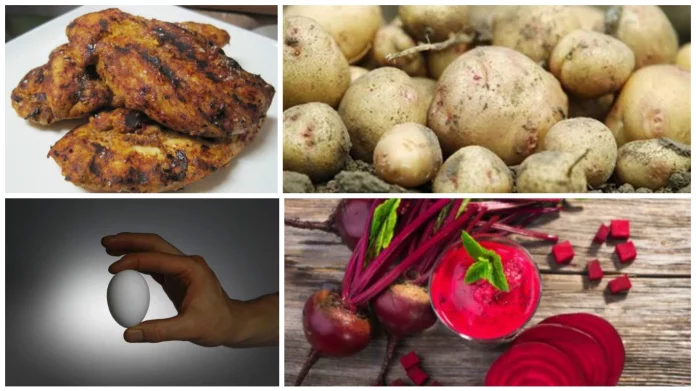Rice
Eggs
Eggs are sensitive to heat, and when they are reheated, they can become rubbery or have a tough texture. The proteins in eggs can denature and cause the eggs to become tough, making them difficult to eat.
Spinach
Spinach contains high levels of nitrates, which can convert into nitrites when reheated. This can cause the formation of harmful compounds, making the spinach unsafe to eat.
Cooked Potatoes
Cooked potatoes contain starch, which can break down when reheated. This can cause the potatoes to become mushy and lose their flavor and texture.
Related Articles
- 8 Foods That Are Good For Your Liver
- 10 Best African Foods and Their Native Countries
- Foods high in protein for weight loss
- Foods and Drugs that causes erectile dysfunction
Chicken
Chicken contains proteins that can denature and cause the meat to become tough and dry when reheated. The risk of food poisoning is also high when chicken is not heated to the correct temperature.
Fish
Fish contains delicate oils and proteins that can become rancid and cause the fish to smell and taste off when reheated. Reheated fish can also become dry and tough, making it unpleasant to eat.
Mushrooms
Reheating mushrooms can cause them to release moisture and become slimy. This can change the texture and flavor of the mushrooms, making them unappetizing.
Sauces
Sauces that contain dairy, such as cream or cheese sauces, can break down when reheated. This can cause the sauce to become grainy and lose its flavor.
Gravy
Gravy contains flour, which can break down when reheated and cause the gravy to thicken and become clumpy. Reheating gravy can also cause it to lose its flavor and texture.
Leftover Vegetables
Vegetables contain high levels of water, which can cause them to become soggy and lose their texture and flavor when reheated. The nutrients in the vegetables can also be lost when they are reheated.
Some foods should never be reheated for safety and quality reasons. To ensure that your leftovers are safe to eat, it’s best to reheat only foods that are suitable for reheating and to do so to the correct temperature. If you’re unsure about whether a food is suitable for reheating, it’s best to err on the side of caution and discard it.

